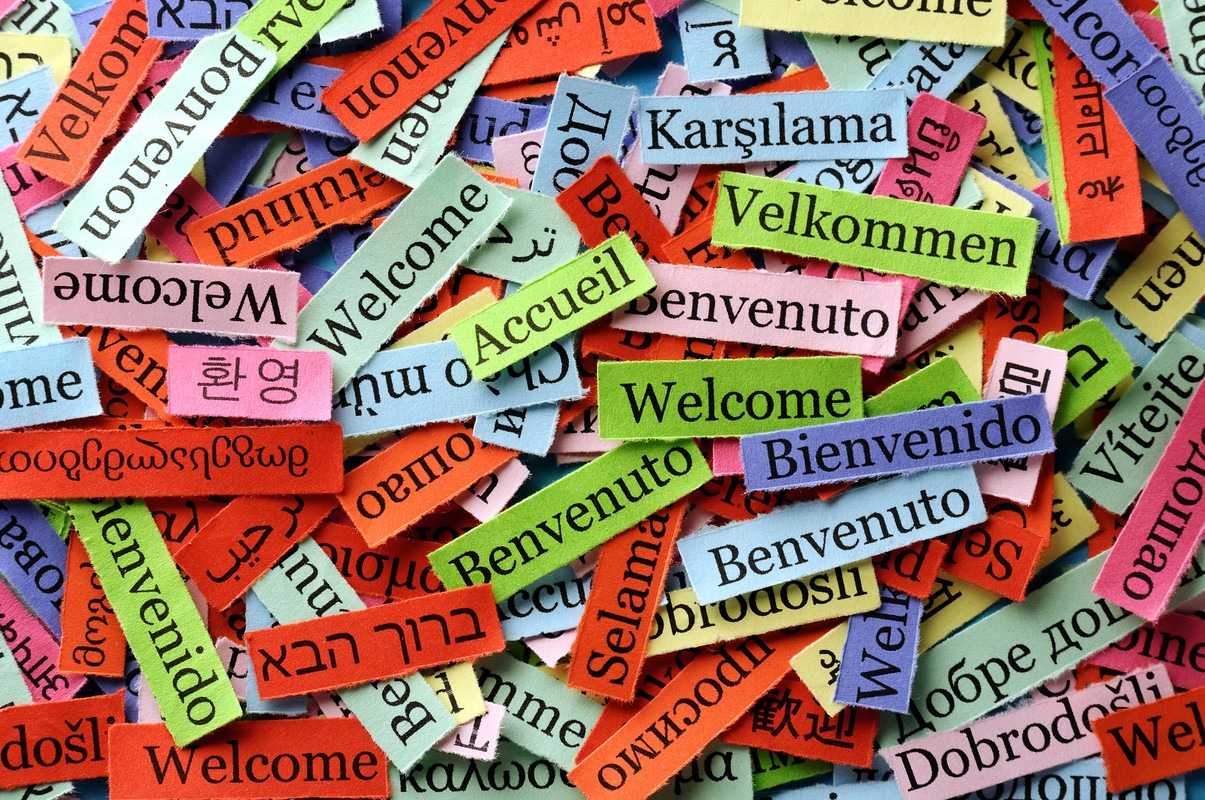Examining Language
In this article series, our members share their thoughts and insights on what is doubtlessly one of our most important tools to create and communicate our identity: language.

The language we use determines how we emote, the things we laugh about, the structures in which we sort our thoughts, and how we view and experience the world in general. It is hard to overstate the importance and significance of language for humans in general. When we venture abroad, particularly into a country where we do not speak the local language, things can quickly become tricky, or even frustrating – after all, there is a chance we cannot communicate who we truly are. Getting to know the local language little by little does not only tell us a lot about the intellectual world of the local population, but is likely to change our own in the process as well – at least to a certain degree. This task is, however, not an easy one, and the language barrier is one of the most widely expereinced roadblocks among expats. In this article series, we feature user-contributed articles dealing with the many different aspects of language and how we experience and use it abroad.
Anastasia Piatakhina Giré: Accent: Keep It or Lose It?
Becoming fluent in a foreign language broadens your world, and opens you some doors and sometimes also some hearts. This is pretty obvious and well known. But in my experience it also involves some loss. And this is usually less acknowledged.
Gabrielle Byko: Overcoming the “Learning A New Language Barrier”
Even though my accent may be something I always have, and I may secretly scowl on the inside when people point it out, I embrace and appreciate that many people regard it is “cute” and “endearing” and I appreciate even more how far I have come – and that should bring a genuine smile to anyone’s face who has overcome such barriers.
Michaela Rossi: Oops, I Did It Again: ESL Pitfalls
It doesn’t help that my children speak English to me (unless I insist otherwise) as was the case here – so to an outsider it must have been quite a picture to hear my Czech ‘oh really’ at the end of the conversation.
In this article series, our members share their thoughts and insights on what is doubtlessly one of our most important tools to create and communicate our identity: language.

If you are on the move already for a while, you eventually managed to learn several languages as I did. This is your strength, and often, sedentary people – if you manage to see any – make you the same tiresome remark: “I wish I could speak languages as you! You are so lucky”. How do these words make you feel? When it happens to me, my first reaction usually is irritation. I often resist telling them how much work and struggle it involved, and how much loss too.
Becoming fluent in a foreign language broadens your world, and opens you some doors and sometimes also some hearts. This is pretty obvious and well known. But in my experience it also involves some loss. And this is usually less acknowledged.
Two Sides to Every Coin
I remember reading a book about multilingualism years ago, a curious reflexion about the loss of sense of humour. It was saying something about how we tend to lose most of our ability to make a good joke when speaking another language. Back then I used to think of myself as being quite witty, and highly appreciated a good joke from others. At the hard times of Perestroika, the humour was often a healthy deflection, a helpful survival strategy.
Later, I became fluent in Italian. Living in magical Naples, even if I learnt how to appreciate the local, baroque, humour, I certainly was less able to produce quality jokes myself. More than once I managed to make my Italian friends laugh, but occasionally it was at my expense; it happened to me to mistakenly use “scappare: to escape” instead of “scopare: to have sex”.
After having spent half of my life abroad and speaking mainly in foreign languages, I am wondering what the risk might be of losing some of my own language? When I go back to my country or read friends’ chat messages, I feel left behind. They use slightly different words, they laugh at new jokes. The language evolves, and quickly enough; and I am not around anymore to keep up with this speed.
Our language is not only our expression tool, but also an intrinsic part of our life story. We make sense of our experience by organizing our thoughts into speech in a given language. Leaving our country of origin we are losing the fluidity of the context.
The whole subject can suddenly become blurred, which creates an understandable confusion around identity. One of the trickiest questions we might be asked then: “What language do you speak?” Have you ever felt confused, not being able to give a straightforward answer?
Linguistic Shame
As a result, I often feel less articulate not only in my new set of languages but also in my own native Russian. When I need to speak with somebody I don’t know well yet, I feel anxious about how my verbal expression will be perceived. Will I be articulate enough? It may often cause frustration on both sides, and does not really help the dialogue. And, what about when you are facing the necessity of writing your CV, or calling a headhunter, writing a report or going through a job interview? The “accent issue” may become a real anxiety buster. When we feel anxious and worried, it is only more likely that we lose some of our verbal skills. Have you ever felt for some reason ashamed of your accent? It certainly happened to me – you know that feeling when somebody asks you to repeat three times, and every time you do, the person still does not get it, and keeps staring at you with the most puzzled expression. By the third time, your initially witty remark loses all its interest, and seems quite stupid. You go blank, you want to sink, to disappear under the ground. You may feel ashamed and eventually start hating this person and yourself. And when feeling ashamed one usually tends to regress and, again, lose one’s verbal and cognitive skills. Welcome to the vicious circle of the linguistic shame!

Keep It or Lose It
The other day I was listening to a French friend speaking over the phone with somebody in London, and wondered how much his noticeable French accent may influence the person on the other side of the line. This person might find the French charming, he even might have some very pleasant associations from his past around French people. But it is also plausible that this accent might trigger some negative emotional experience, which, even if unconsciously, will influence his current emotional reaction. Imagine if the lady on the other side of the line had had the most awful romantic experience with a French guy, or going through divorce with a French husband? Unconsciously she will associate that person to this one, eventually cataloguing him into “the untrustworthy” French guy category, on the conscious level she might just happen to be very busy and forget about his request.
If you are lucky enough, the person in front of you has some positive associations with your accent, if not – you are having a bad start.
The unconscious communication being a subtle matter, in every dialogue, we transmit information by numerous different ways: everything participates in creating the communication field – the tone of our voice, the way we move, the colours we wear. If, in addition, we have an accent, it complicates the matters even more.
If we have experienced any kind of prejudice or have been labelled just because of our accent, we would naturally want to lose it. It is always tough to be a minority. If you feel that way, it takes a lot to display your accent. I always admired those who were blunt enough to show their belonging.
However fluent you are in the language of your new country, some things have to be said in you native language. You know how, if you get really really angry, the words surprisingly come to you in your first language.
Do you find that the swearing is more satisfying in your native language? Does “I love you” seem somehow more meaningful when said in your own language?
The same applies to the field of therapy; after all it is about expressing our feelings and thoughts, and exploring them alongside with somebody in a space free of judgement and prejudice. Sharing our thoughts and feelings usually helps to gain clarity and, eventually also acceptance of our particular, beautiful, funny, southern, unusual, improbable, unbelievable, and unique accent!
Anastasia Piatakhina Giré is an integrative psychotherapist practicing in Madrid, and also worldwide through Skype.
In this article series, our members share their thoughts and insights on what is doubtlessly one of our most important tools to create and communicate our identity: language.

“You aren’t from here, are you?” – is a question that myself and other expats tend to be asked on a regular basis, whether it be from the observation of differences in our outward appearance and style of dress compared to the local population, or in my case in response to hearing which normally triggers that inquiry: my accent.
I only need to utter a few words before it becomes blatantly obvious to any native German speaker that I am not an actual German but rather a native English speaker, and an American English speaker at that. Living in a foreign country always poses challenges, but finding oneself in a foreign country which speaks a different language than your own native language is indeed at times a very daunting task. Regardless of how much one knows of the language beforehand, moments of confusion are bound to be experienced, and when one knows little to none at all of the new language, it makes it all that much harder in successfully adjusting to one’s new environment.
Over 5 years ago I moved to the German speaking world knowing only the common German words that also happened to be borrowed in the English language, like kindergarten, sauerkraut and Oktoberfest. It became very obvious to me within the first moments of arriving in my new home that these few words and the previous weeks I spent listening to German language CDs were not going to get me so far in being able to communicate with the locals, and I became very anxious to not only learn, but also master German. This initial enthusiasm helped me pick up the basics of the language very quickly. However, learning a new language comes in waves of highs and lows accompanied by quite a bit of frustration and road blocks along the way.

Enthusiasm Is Nothing without Perseverance
As a native English speaker, we certainly have it easier when initially arriving in a foreign country as most people in this day and age can speak some degree, if not nearly flawless English. However this advantage can then become a hindrance when trying to learn the native language of the new country. I have found that many people are very anxious to improve their own English skills with a native English speaker and try always to speak with me in English, or upon situations when someone hears me struggling to explain something in German they assume switching to English would just be easier. Though I know the switching to English is well intentioned, and at times it is indeed easier to then just lapse into English, I would encourage persisting on in the new language unless otherwise needed. You can’t control what the other person is speaking to you (unless of course you politely ask them to switch!), but you can choose regardless to speak back to them in the language you are trying to learn, and persist with it.
Actually persistence is really the main key to not only successfully learn but to also get on the correct path of mastering a language. Persist in reading the language, persist in hearing the language and most of all, persist in using and speaking the language no matter which level you are. It’s always a bit nerve-racking in the beginning to try to speak a new language but it’s one of the most critical steps in actively being able to use a language. Most people are very friendly and will be happy to hear you trying to speak their language, so don’t be embarrassed about making mistakes. Go out there and use it! Join a club, make some friends, find a language partner, or even better, a romantic partner (certainly one of the best forms of motivation to learn a language!) with whom you can practice. And even when your initial fast language acquisition curve starts to taper off and plateau, don’t despair! Stay positive and keep on persisting. By putting in the continued effort you will be amazed when, out of nowhere, one day you notice how you understand pretty much everything everyone is saying around you and you too can now use the new language rather freely.
A Rewarding Challenge
Half a decade later, I can comfortably say that I am rather fluent in German. I can say almost anything I want to rather freely, and I have built many friendships based solely through communicating in German – I no longer have to rely on primarily doing hand gestures to get across what I want to say, which is quite the accomplishment! German has even become one of my primary working languages. It certainly was a long road to reach this point, however I feel very proud for working through my frustrations and persisting despite the challenges learning German provides. Every now and then I still find myself in situations where I struggle to form what I want to say, or I may be put in the dreaded group settings with people who use heavy dialect and I have no clue what anyone is saying, or I may even completely blank out on knowing the correct word to use and have people looking at me perplexed at what I am trying to say, but these moments happen less and less. Even though my accent may be something I always have, and I may secretly scowl on the inside when people point it out, I embrace and appreciate that many people regard it is “cute” and “endearing” and I appreciate even more how far I have come – and that should bring a genuine smile to anyone’s face who has overcome such barriers.
Gabrielle Byko is an international communication professional who has a passion for world travel and experiencing international culture exchange in all of its forms. Gabrielle is our Local Reporter in Regensburg.
In this article series, our members share their thoughts and insights on what is doubtlessly one of our most important tools to create and communicate our identity: language.

Whilst in a busy park with my children, listening carefully to their lovely stories, I shook my head in amazement, acknowledging them with a very loud and an exciting: ‘fakt jo (pronounced /Fa:k jəʊ/)?!’ which casually translates to ‘oh really’ or ‘wow’ in Czech. It doesn’t help that my children speak English to me (unless I insist otherwise) as was the case here – so to an outsider it must have been quite a picture to hear my Czech ‘oh really’ at the end of the conversation.
It is always comforting to hear that I am not the only one though: Speaking to my Italian friend about these embarrassing but funny moments where languages cross (even though you don’t want them to!) we laughed at her: ‘dai’ (/d:jɛ/). Of course she was not telling her children ‘to die’ but she was only prompting them to hurry up!
Mastery vs. Perfection
Just recently when I thought that, after all those years, I had mastered the English language yet another conversation ended up in a pronunciation error. We talked about the reasons for animals such as dogs having to spend time in quarantine before entering the UK. As I described, it was because the UK did not want to have problems associated with ‘rabbis’. After this mishap, I promised to remember to know how to pronounce ‘rabies’ correctly.
The same friend also enlightened me about the whole Christmas Pantomime thing. I thought the show was very odd and that we must have had bad luck as the original male actor must have fallen ill at a last minute – why else would there be a female actress playing Aladdin and what’s with that man in dress playing Aladdin’s mum? It was then explained to me that traditionally, that’s what happens in every Pantomime and is what makes it special, just a fun casual tongue in cheek light-hearted play!
Similarities in words also sometimes took me and the listener by surprise. Jumping off a screwdriver is not what I meant to say while having a serious chat about unfortunate people desperate enough to commit suicide. Skyscraper was the word I was looking for! Well, at least we embarked on a merrier conversation after that.
In times back ‘then’ before mobile phones, it was harder to get things right immediately and correct a misunderstanding – once I waited in Marble Arch for a friend of mine for two hours wondering if she had forgotten about our appointment while she was thinking the same waiting for me – in Archway.
It Can Happen in Any Language
In other situations you think you are safe with your own language, as my friend and I did once. While on a London bus, we engaged in a conversation about the difference between male and female anatomy. We were talking about bodily hair and sweating being connected to ‘being hairy’. We used the man sitting next to us as a ‘typical’ example as he was not exactly Matt Lucas type, quite the contrary. Little did we know the man was Czech, enjoying our conversation, and letting us fully engage in it before thanking us at the end for an educating and enlightening view. He also promised to wax next time.
Another time, whilst in a Spanish class in Spain, I was asked to describe how my day starts every morning. I started describing how I loved my pet bunnies, how I fed them as soon as I woke up and played with them every morning. I should have known that conejo has more than one meaning. Of course, my classmates thought I was playing with the plastic type. I tried my best to explain that I didn’t engage in such activity every morning, but whatever I said did not mean much as since that day my entrance was followed by laughter and never-ending jokes.
Well, apart from occasional embarrassment and the odd awkward moment there is a positive side to this: ESL can sometimes be used as an excuse for my unsuitable and politically incorrect language!
Michaela Rossi was born in the former Czechoslovakia and moved to the UK at the age of 19. She followed her husband on his work assignment to Spain in 2004 where their children were born. In 2011, they moved back to the UK, this time to Hampshire, where they love being outdoors, always admiring the beautiful English countryside and exploring their local area.
Advertisement
About Franziska Mutsch
Article topics
Related articles
Using Your Native Tongue: A Reflection
“You sound arrogant and illiterate when you use so many English words in your Danish.” The comment was from a friend who, just like myself, is 100% Danish. Danish family, Danish upbringing, Danish everything. The only difference between him and me is that I moved abroad when I was 19 years old and today – at the age of 33 – am trilingual.
Learning French and How I Made It Happen
In the beginning, learning French was quite a challenge for InterNations member Suzanne. From struggling in an intensive language class to making friends and finally losing her fear of speaking the language — find out all about her language learning journey!
Where Pointing Will Only Get You So Far
Did you face a language barrier when you first moved abroad? The answer typically depends on where you’re from — and where you’re going. Because for some countries, getting by without local language skills can be tricky. Can you guess which?
A Nation’s Experience of Learning English
In recent times, English has become somewhat of a lingua franca and learning the language has become an important part of most curricula and is often essential to finding a job. But, as InterNations member Ayhan knows, there is more to cross-cultural communication than just language skills.
Does Every Language Need a Word for Heimat?
Heimat — the German word for ‘home’ — has a long and complicated history, but is booming again in German popular culture. This article explores this trend and the deeper meanings, good and bad, of the word behind it. Could it be relevant for all expats today — and why?




